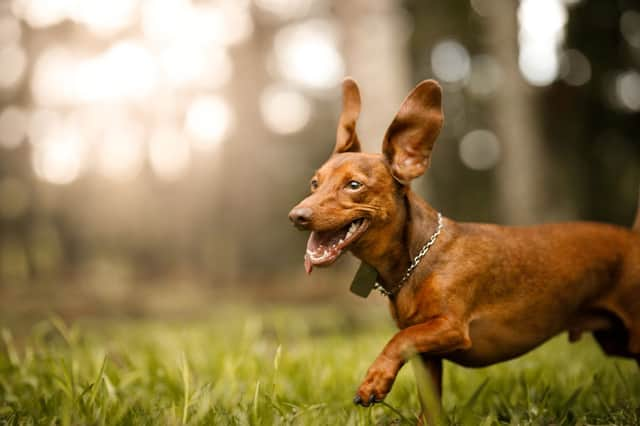Apartment Dogs: Here are 5 expert tips on keeping a hyperactive dog happy in a city flat


Puppies can get into A LOT of mischief - especially when they have boundless energy and there is limited living space.
In cities like Edinburgh and Glasgow, where flat spaces can be a bit of a squeeze, it’s really important for pup owners to understand how they can care for their hyperactive little one!
Advertisement
Hide AdAdvertisement
Hide AdHaving a dog in a small space can be a bit tricky, but it's not mission impossible. Depending on the size of your dog and how much energy it has; you’ll need to be wary of how much time you’re allowing your furry little friend to exert its energy.
Increased energy levels in your puppy also tend to occur when your pooch is going through ‘doggolescence.’
To help dog owners manage their pup's infinite energy and the notorious zoomies, Director of the UK Dog Behaviour Training Charter Lorna Winter, who is also co-founder of Zigzag, has outlined her top tips for managing hyperactive puppies when living in a big city.
Here's what she had to say.
Understand your puppy breed
Size doesn't always tell the whole story when it comes to finding a dog that will work well in a small space. It's not about whether your puppy is big or small; but really about their energy levels. While some breeds like terriers, toy breeds, and beagles might make your cosy space a bit lively, you'd be amazed at how well-behaved and laid-back some of those larger breeds, such as St. Bernards and Great Danes, can be in an flat setting.
Understanding your puppy's breed and how much exercise your puppy needs each day will allow you to manage its boundless energy.
Mental and physical stimulation
Living in a small space can be a bit confining for your furry friend. In such close quarters, there's not loads of space for them to stretch their legs, burn off energy, or have some playtime. This might leave your little buddy feeling a bit stir-crazy or even resorting to some less-than-ideal energy outlets such as chewing furniture, barking or whining to go out.
Once you have a full understanding of how much exercise your dog breed needs; it’s vital to take your dog out as much as it requires. At the very least, you should aim for two walks or two bits of outdoor exercise per day; in and amongst training of course! As well as needing to stretch their legs and go to the toilet, your puppy needs the mental stimulation of being outside and playing.
As well as walkies, providing your puppy with the right amount of mental stimulation such as puzzle games, sniff / scent trails or chew toys will also mean your puppy doesn’t get bored and feel like it’s living groundhog day! It’s not all about physical stimulation - mentally tiring out the pups can often be even more effective, especially combined with regular trips outside.
Change it up
Advertisement
Hide AdAdvertisement
Hide AdDoing the same walk everyday will not only get boring for you, but it won’t excite your little pooch either. Changing up your walking locations will mean that your puppy will likely exert more energy sniffing and exploring the new places; meaning they'll be lovely and tired when they’re back home. Find a variation of local parks you can walk or drive to, or even meet up with a fellow dog parent to allow your puppy to play with their canine companion. New environments and new faces will mean your puppy won’t get bored of the same routine and will use up all its ‘zoomies’ to roam around and inspect its new surroundings.
Create a quiet place for your pup
Certain flats can get quite bustling and noisy, especially in big cities like Edinburgh or Glasgow. It might require some time for your dog to adjust to the unfamiliar sounds and surroundings. Particularly in small spaces, your puppy may feel it’s in the way when it decides to finally rest its head on your sofa or carpet.
Making sure your furry little friend has the space to rest and cuddle up to their favourite toys will also make your puppy feel safe and relaxed in their environment.
Ask for help
Lots of dog breeds thrive on outdoor activity and staying active, but this can pose a challenge for pup owners with busy schedules that keep them away from home for long stretches of time.
Enlisting the help of a friendly neighbour or a friend to take your pup on daily walks or runs while you're away from home will help to manage your puppy’s energy throughout the day. Alternatively, if your budget allows a certified dog walker or daycare service this may also help to spread out the number of walkies.
Supporting your puppy’s energy levels with regular exercise will mean they are a more pleasant dog for you at home during training or playtime.
Living in a small space in a city isn't easy for anyone. Then adding a puppy into the mix can make the space feel EVEN smaller. Ensuring your puppy feels safe and comfortable in your home as well as being well-exercised will ensure your puppy remains happy and fulfilled (and your sofa isn’t eaten!)
Comments
Want to join the conversation? Please or to comment on this article.